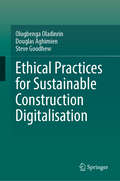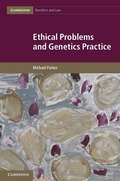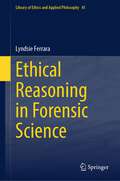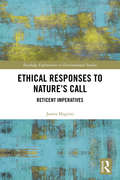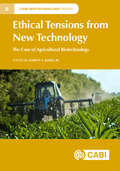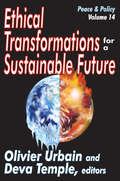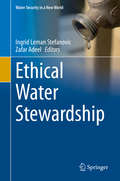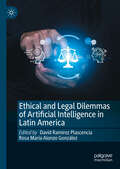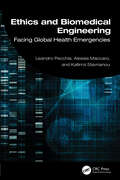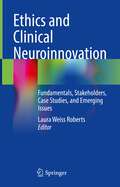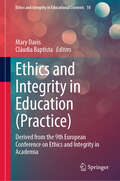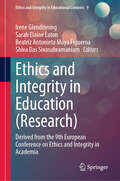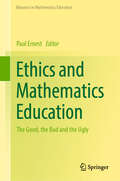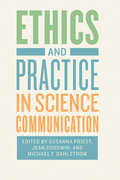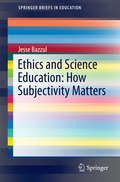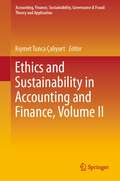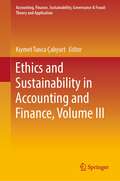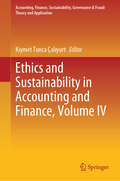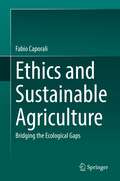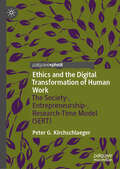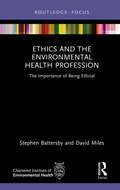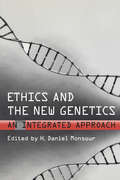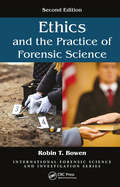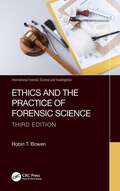- Table View
- List View
Ethical Practices for Sustainable Construction Digitalisation
by Steve Goodhew Douglas Aghimien Olugbenga OladinrinThis volume provides a framework for ethical and sustainable digitalization in the construction industry. The fourth industrial revolution has significantly changed how industries worldwide operate and deliver their products and services. This paradigm shift has brought with it ubiquitous emerging physical, biological and digital technologies that are disrupting activities in industries across the globe. The construction industry is not immune to the disruption of these technologies. From solving the issues of poor cost, time and quality that has bedevilled the industry for a long while to ensuring clients are satisfied and workers are safe, digital technologies have proven to be effective in improving how the construction industry function. For instance, the use of building information modelling has garnered considerable attention in addressing salient design and collaboration issues, among others, facing the industry. In the same vein, the internet of things, big data analytics, cloud computing, drones, robotics, sensors and a host of other technologies have been explored to improve the management and delivery of construction projects. Regrettably, this concept of ethics has been downplayed in the quest for the digital transformation of construction industries worldwide. For the successful digitalisation of the construction industry, which relies heavily on human interaction with technology, the role of ethics cannot be overlooked. There is an absence of a roadmap for the ethical use of digital technologies in the digitalisation of the construction industry. This book, which is designed to give direction for the ethical use of digital tools in the construction industry, fills that gap.
Ethical Problems and Genetics Practice
by Michael ParkerEthical Problems and Genetics Practice provides a rich, case-based account of the ethical issues arising in the genetics clinic and laboratory. By analysing a wide range of evocative and often arresting cases from practice, Michael Parker provides a compelling insight into the complex moral world of the contemporary genetics professional and the challenges they face in the care of patients and their families. This book is essential reading for anyone interested in the ethical issues arising in everyday genetics practice. Ethical Problems and Genetics Practice is also a sustained engagement with the relationships between bioethics and social science. In proposing and exemplifying a new approach to bioethics, it makes a significant contribution to debates on methods and interdisciplinarity and will therefore also appeal to all those concerned with theoretical and methodological approaches to bioethics and social science.
Ethical Reasoning in Forensic Science (Library of Ethics and Applied Philosophy #41)
by Lyndsie FerraraThis book explores the impact of ethical reasoning in forensic science and demonstrates that it is in fact a foundational skill required by those engaged in the field. Forensic science is viewed as a mechanism to aid the criminal justice system in finding truth, but failures within the field contribute to the growing injustice facing society. The author recognizes these failings and brings a new perspective by establishing bioethical principles as a foundation for improving ethical reasoning skills. These skills are a critical component of forensic science education for upcoming professionals. While other books focus on egregious cases of ethical misconduct, this text highlights the daily decisions and issues that occur during the forensic investigation and analysis processes. It is written for future forensic professionals and forensic science educators, as well as those individuals already working in the forensic science field.
Ethical Responses to Nature’s Call: Reticent Imperatives (Routledge Explorations in Environmental Studies)
by James MagriniArguing for a renewed view of objects and nature, Ethical Responses to Nature’s Call considers how it is possible to understand our ethical duties - in the form of ethical intuitionalism - to nature and the planet by listening to and releasing ourselves over to the call or address of nature. Blending several strands of philosophical thought, such as Graham Harman’s Object-Oriented Ontology, W. D. Ross’s prima fathics, Alphonso Lingis’s phenomenological ethics traceable to The Imperative, and Michael Bonnett’s ecophilosophy, this book offers a unique rejoinder to the problems and issues that continue to haunt humans’ relationship to nature. The origins of such problems and issues largely remain obscured from view due to the oppressive influence of the "Cultural Framework" which gives form and structure to the ways we understand, discourse on, and comport ourselves in relation to the natural world. Through understanding this "Cultural Framework" we also come to know the responses we continue to offer in answer to nature’s call and address, and are then in a position to analyze and assess those responses in terms of their potential ethical weight. Such a phenomenon is made possible through the descriptive-and-interpretive method of eco-phenomenology. This renewed vision of the human-and-nature provides direction for our interaction with and behavior toward nature in such a way that the ethical insight offers a diagnosis and provides a potentially compelling prescriptive for environmental ills.
Ethical Tensions from New Technology: The Case of Agricultural Biotechnology
by Rachel A. Ankeny Philipp Aerni Bartosz Bartkowski Heather J. Bray Bradley Martin Jones Deepthi E. Kolady Jane Kolodinsky Katie M. MacDonald Kelly A. McKinley Desmond Ng Frauke Pirscher Roberto Quiroz Dane Scott Shivendra Kumar Srivastava Debra M. Strauss Insa Theesfeld Johannes Timaeus Corrine Valdivia Duane WindsorThe introduction of new technologies can be controversial, especially when they create ethical tensions as well as winners and losers among stakeholders and interest groups. While ethical tensions resulting from the genetic modification of crops and plants and their supportive gene technologies have been apparent for decades, persistent challenges remain. This book explores the contemporary nature, type, extent and implications of ethical tensions resulting from agricultural biotechnology specifically and technology generally. There are four main arenas of ethical tensions: public opinion, policy and regulation, technology as solutions to problems, and older versus new technologies. Contributions focus on one or more of these arenas by identifying the ethical tensions technology creates and articulating emerging fault lines and, where possible, viable solutions. Key features include: Focusing on contemporary challenges created by new and emerging technologies, especially agricultural biotechnology. Identifying a unique perspective by considering the problem of ethical tensions created or enhanced by new technologies. Providing an interdisciplinary perspective by including perspectives from sociologists, economists, philosophers and other social scientists. This book will be of interest to academics in agricultural economics, sociology and philosophy and policymakers concerned with introducing new technology into agriculture.
Ethical Transformations for a Sustainable Future: Peace and Policy (Peace And Policy Ser.)
by Deva TempleIt has become increasingly apparent that humanity's complex social, political, and economic systems are incompatible with the finite capacity of the Earth to replenish resources and absorb wastes. If the planet is to continue to be habitable for the myriad web of other creatures that make life possible, humans must transform their systems so that they are aligned with natural systems. One thing is sure it will not be Nature's laws, the delicate interdependence that characterizes Earth's ecosystems, that change. The change must begin within each person, and from there permeate throughout our social, political, and economic structures.The contributors to this volume believe that such transformations are urgently needed and possible, and they offer specific examples. They suggest solutions that call for new perspectives in our ethics, beliefs, traditions, economy, business, gender relations, education, and technology. They show that human beings have the power to implement changes in all natural and social environments.The chapters in this book have been organized around three keywords: Reconnecting, Reframing, and Rethinking. The contributors argue that we need to reconnect with the Earth and nature, as well as with each other and parts of ourselves that we have ignored for too long. We need to reframe the way in which people prioritize choices in the economy, the way we do business and pursue development; and we need to rethink the mission of education and the roles of technology.
Ethical Water Stewardship (Water Security in a New World)
by Ingrid Leman Stefanovic Zafar AdeelThis interdisciplinary book brings philosophers and non-philosophers to the table to address questions of water ethics, specifically in terms of how moral questions inform decision making around water security at local, national, and international scales.Water security, which pertains to the experience of assured access to clean water, is a broad concept that intersects human rights, politics, economics, law, legislation, public health, trade, agriculture, and energy. Decisions made at each of these intersection points have ramifications for human well being, especially for the populations that are marginalized in a societal and political sense. In this book, the ethical dimensions of decision-making at those intersection points are explored, and real-world examples are used to tease out some key insights. It charts how ethical consideration can help shape a future in which everyone will be water secure.
Ethical and Legal Aspects of Computing: A Professional Perspective from Software Engineering (Undergraduate Topics in Computer Science)
by Gerard O'ReganThis textbook presents an overview of the critically important ethical and legal issues that arise in the computing field and provides a professional perspective from software engineering. The author gained exposure to these aspects of computing while working as a software engineer at Motorola in Ireland, where he coordinated the patent programme and worked with several software suppliers. Topics and features: Presents a broad overview of ethics and the lawIncludes key learning topics, summaries, and review questions in each chapter, together with a useful glossaryDiscusses the professional responsibility of computer professionalsExplores ethics in various civilisations and religious traditionsDiscusses ethical software engineering and ethical outsourcingConsiders what is fair and ethical in data scienceDescribes ethical challenges that arise in social media and the AI fieldReviews intellectual property including patents, copyright and trademarks This practical and easy-to-follow textbook/reference is ideal for computer science students seeking to understand legal and ethical aspects of computing. The text also serves as a concise self-study primer for software engineers and software managers.
Ethical and Legal Dilemmas of Artificial Intelligence in Latin America
by David Ramírez Plascencia Rosa María Alonzo GonzálezThis book analyzes the potential benefits of using artificial intelligence to surpass traditional social and economic problems in Latin America, but it also looks to understand the perils and barriers derived from the adoption of this technology. This volume is divided in Section 1. &“Considering AI in the private sphere&” that debates about the employment of artificial intelligence from the citizen&’s perspective. It embraces topics related with the introduction of AI in the media and the labor market, and how Latin Americans perceive, engage and mobilize before the rising presence of AI in their daily lives. Section 2. Challenges and promises of AI in the public sector centers on the ethical and legal controversies triggered by the incorporation of artificial intelligence in the public sphere. It focuses on the promising benefits of introducing AI in the public administration, education and public security, but also the latent impacts on human rights.
Ethics and Biomedical Engineering: Facing Global Health Emergencies
by Leandro Pecchia Alessia Maccaro Kallirroi StavrianouThis book is about the interaction between biomedical engineering and ethics during emergencies, such as low-resource settings and the COVID-19 pandemic. It addresses the issues between the universalism of human rights, ethical principles, and regulatory standards of biomedical devices in the context of emergencies. Ethics and Biomedical Engineering: Facing Global Health Emergencies connects biomedical engineering and ethics with particular regard to emergency context such as in low-income countries and the COVID-19 pandemic. It examines how the COVID-19 crisis exposed gaps in access to healthcare, ignited debates about resource allocation, and highlighted the importance of patient privacy. The book presents case studies conducted in Africa and the role of the biomedical engineer (and more generally the scientist) during a pandemic or other health emergency. The book also addresses the way in which the pandemic has been addressed in low-income contexts. Finally, it also explains the need for an interdisciplinary approach between scientists, ethicists, and policymakers to improve outcomes in the future.The book is intended for undergraduate and graduate students in bioengineering. It would also be useful for policy makers and medical professionals that could be faced with ethical dilemmas in times of crisis.
Ethics and Clinical Neuroinnovation: Fundamentals, Stakeholders, Case Studies, and Emerging Issues
by Laura Weiss RobertsNew ways of understanding the brain – its nature, its capacities, its function, and its dysfunction – hold great promise for human wellbeing. Novel therapeutics spurred by this understanding have important roles addressing many clinical conditions, including Alzheimer Disease, depression, addiction, and obsessive-compulsive disorder. This unique title explores a wide range of groundbreaking sciences and clinical practices for brain-based conditions, including deep brain stimulation, optogenetics, technology-delivered therapies, predictive testing, and new clinical uses of ketamine, cannabis, and other psychoactive substances.An introduction to the imperative to develop new treatments for devastating brain disorders and the state of current therapeutics in psychiatry, addiction, and behavioral disorders is presented, and chapters from leading physician-scientists and neuroethicists outline the clinical and the ethical issues arising in innovation and in the creation of new therapeutics for brain diseases. Written by renowned thought leaders in their fields, the book presents tightly written contributions on novel qualitative and quantitative data from stakeholders in the field, including neuroscientist-clinicians, people living with mental illness and/or addictions, and oversight/policy stakeholders. Concise, anticipatory, and centered on the principles governing human biomedical research and innovation in developing novel therapeutics for brain disorders, Ethics and Clinical Neuroinnovation will be of great value to clinicians, researchers, and students from a vast array of backgrounds, including neuroethics, neuroscience, psychology, psychiatry, philosophy, entrepreneurship, and the law.
Ethics and Integrity in Education: Derived from the 9th European Conference on Ethics and Integrity in Academia (Ethics and Integrity in Educational Contexts #10)
by Mary Davis Cláudia BaptistaThis book offers a collection of effective and insightful practices in academic integrity through diverse perspectives and global contexts. Contributors ranging from faculty, academic integrity leads, academic conduct officers, student support staff, independent researchers and students in nine different countries share their collective knowledge and understanding based on their roles, work and study in academic integrity. The main themes of the chapters focus on innovation and collaboration, community and culture, stakeholders in academic integrity and awareness of breaches and ethics. Within these themes, the contributors explore Artificial Intelligence tools, inclusion, collaboration with students, networks, publishing, setting up research offices, student champions at high school and university, and academic conduct breaches. The chapters end with calls to action and recommendations for readers to incorporate into their practice. In these ways, the book aims to raise awareness of important issues in academic integrity contexts and support the continued development of practice.
Ethics and Integrity in Education: Derived from the 9th European Conference on Ethics and Integrity in Academia (Ethics and Integrity in Educational Contexts #9)
by Sarah Elaine Eaton Irene Glendinning Beatriz Antoneita Moya Figueroa Shiva Das SivasubramaniamThis book provides insights on approaches for enhancing ethical practice, professionalism and integrity for future development in academia and beyond. It does so by offering a thorough review of the background and processes to enhance academic integrity in the years of artificial intelligence. The book also explores the future of research integrity and ethics by examining lessons from the past. Ideas from research findings on how to incorporate an integrity culture in continuously changing secondary and higher education are addressed. The chapters are written by international authors who have been working in the fields of integrity sciences, focussing on ways to enhance ethics and integrity amongst students, academics and institutions (including schools). They identify approaches to deter and detect misconduct and discuss the ways to educate academic integrity amongst academic communities. The book addresses best practices from international institutions and how these can be transformed and adopted in different subject areas. Embracing and managing the use of generative artificial intelligence (GenAI) tools in education are key themes throughout. Special attention is given to the ethical use of GenAI, exploring the ways to minimise the misuses via policies and guidelines.
Ethics and Mathematics Education: The Good, the Bad and the Ugly (Advances in Mathematics Education)
by Paul ErnestThis edited volume is an inquiry into the ethics of mathematics education, and to a lesser extent, the ethics of mathematics. The imposition of mathematics for all raises questions of ethics. What are the ethics of teaching school mathematics? What are the costs as well as the benefits? What are the ethical issues raised by the official aims of mathematics teaching, the planned curriculum, the pedagogies employed in school and college mathematics and the assessment systems? These questions are addressed in the book as well as what systems of ethics we might use. The volume ventures into a burgeoning new field. It offers a unique set of investigations, both theoretical and in terms of practices. It announces the ethics of mathematics education as a new subfield of research and includes valuable contributions from many of the best-known researchers in mathematics education; additionally, it is a valuable resource for students, teachers and researchers in the field. This is an enduring and classic source book in the field. From the wisdom of leading scholars to the little heard voices of students, this collection offers the reader many striking new insights into the ethics of mathematics and education.
Ethics and Practice in Science Communication
by Susanna Priest Jean Goodwin Michael F. DahlstromFrom climate to vaccination, stem-cell research to evolution, scientific work is often the subject of public controversies in which scientists and science communicators find themselves enmeshed. Especially with such hot-button topics, science communication plays vital roles. Gathering together the work of a multidisciplinary, international collection of scholars, the editors of Ethics and Practice in Science Communication present an enlightening dialogue involving these communities, one that articulates the often differing objectives and ethical responsibilities communicators face in bringing a range of scientific knowledge to the wider world. In three sections—how ethics matters, professional practice, and case studies—contributors to this volume explore the many complex questions surrounding the communication of scientific results to nonscientists. Has the science been shared clearly and accurately? Have questions of risk, uncertainty, and appropriate representation been adequately addressed? And, most fundamentally, what is the purpose of communicating science to the public: Is it to inform and empower? Or to persuade—to influence behavior and policy? By inspiring scientists and science communicators alike to think more deeply about their work, this book reaffirms that the integrity of the communication of science is vital to a healthy relationship between science and society today.
Ethics and Science Education: How Subjectivity Matters
by Jesse BazzulThis book encapsulates a line of research that looks at how students are positioned as ethical actors/decision makers in biology education by science policy, curriculum, and classroom resources. Its basis comes from a textbook study that examined how biology texts work to constitute subjectivities related to neoliberalism and global capitalism, sex/gender and sexuality, and ethics. The study found that textbook discourses set limits on a) the types of ethical concerns represented b) the modes of ethical engagement c) the dispositions necessary to engage in ethical action or decision-making. Policy reform, regulation, and personal lifestyle choices were the primary ways students could approach ethical decision-making or action. While these approaches are useful, they are likely not sufficient for dealing with major twenty first century problems such as climate change and social inequality, along with new ethical dimensions introduced by biotechnologies and genomic research. This research brief sets a context for how discourses of science education policy and curricula work to shape a 'subject of ethics', that is how students come to see themselves as participants in issues of ethical concern. Drawing from a structural-poststructural philosophical approach, Science and Technology Studies, educational research, and a methodology based on discourse analysis and ethnography, this book's overall goal is to assist with research into subjectivity, ethics, politics, policy, and socioscientific issues in science education.
Ethics and Sustainability in Accounting and Finance, Volume II (Accounting, Finance, Sustainability, Governance & Fraud: Theory and Application)
by Kıymet Tunca ÇalıyurtThis book continues the discussion on recent developments relating to ethical and sustainable issues in accounting & finance from Ethics and Sustainability in Accounting and Finance, Volume I. Accounting is often seen as a technical discipline that records, classifies and reports financial transactions. However, since the financial information produced concerns all interest groups both within and outside the enterprise, accounting also has social characteristics and involves multi-faceted duties and responsibilities. As such, in addition to basic principles and accepted rules and standards in the field, this book focuses on the ethical aspects and fundamentals of this profession that accountants should also take into consideration, as this is the only way to build and preserve society’s confidence in accounting and increase its social credibility.
Ethics and Sustainability in Accounting and Finance, Volume III (Accounting, Finance, Sustainability, Governance & Fraud: Theory and Application)
by Kıymet Tunca ÇalıyurtThis book continues the discussion on recent developments relating to ethical and sustainable issues in accounting and finance from the book , Volumes I and II, looking into topics such as the importance of good governance in accounting, tax, auditing and fraud examination, ethics, sustainability, environmental issues and new technologies and their effects on accounting and finance, focusing in particular on environmental and sustainability reporting in the oil and gas and banking sectors. The book also considers the growing importance of audit quality in this time of the COVID-19 pandemic.
Ethics and Sustainability in Accounting and Finance, Volume IV (Accounting, Finance, Sustainability, Governance & Fraud: Theory and Application)
by Kıymet Tunca ÇalıyurtThis book continues the discussion on recent developments relating to ethical and sustainable issues in accounting and finance from Volumes I to III, looking into topics such as the importance of good governance in accounting, tax, auditing and fraud examination, ethics, sustainability, environmental issues, and new technologies and their effects on accounting and finance, focusing in particular on environmental and sustainability reporting in the oil and gas and banking sectors.
Ethics and Sustainable Agriculture: Bridging the Ecological Gaps
by Fabio CaporaliThis book describes the alarming condition of agriculture in the Anthropocene, when the ethical conception of agriculture as a service of common utility for both society and environment has progressively been marginalized. The ethical utility of agriculture has been sidetracked with the increasing industrialisation of society, the involvement of agriculture in the business-as-usual economy, and the consequential environmental and societal impacts it has had. Thus, re-establishing a meaningful bridge between ethics and agriculture is necessary. A relatively new science (ecology) with both a new epistemological tool (that of the ecosystem concept), and a unique narrative of sustainable development, can help bridge this gap. This book focuses on ethics as a lever for raising scientific, technical, social, economic and political solutions to adopt in agriculture as a model of symbiotic relationships between man and nature. It provides a detailed discussion of the ecological intensification practices in order to maximize ecological and ethical services, wherein agroecosystems will follow.
Ethics and the Digital Transformation of Human Work: The Society-, Entrepreneurship-, Research-Time Model (SERT)
by Peter G. KirchschlaegerDigital transformation and &“AI&”— more adequately defined as &“Data-Based Systems DS&”— will create new jobs and lead to disruptions. Will digital transformation and Data-Based Systems DS lead to a massive reduction of paid professional tasks for humans? This book offers a critical and comprehensive discussion of the impact of digital transformation on human jobs from an ethical perspective. It presents an ethically sound and concrete model to address this pressing issue for societies worldwide: the Society-, Entrepreneurship-, Research-Time-Model (SERT).
Ethics and the Environmental Health Profession: The Importance of Being Ethical (Routledge Focus on Environmental Health)
by Stephen Battersby David MilesProviding an exploration of the discussion on how a stronger ethical basis for the work of environmental health practitioners (EHPs) can contribute to improved public health, because EHPs/environmental health officers (EHOs) come into daily contact with members of the public to address threats to their health and wellbeing. This book examines what is meant by professional ethics and the role of professional bodies in ensuring members of the profession act ethically. They should be expected to act as guardians of the public interest, without fear or favour. Ethics is an integral part of public health decision-making and needs to be incorporated into public and environmental health policy development and decision-making. This work, while seeking to stimulate debate within the environmental health profession, will examine what this means for EHPs.Ethics and the Environmental Health Profession: The Importance of Being Ethical explores the process of ethical decision-making in the environmental health profession and asks the question of whom EHPs have an ethical duty towards in their work. It looks at a variety of ethical issues which arise for EHPs working in local government, as consultants or for commercial companies.This book is useful for EHPs globally, other local government officers, educational establishments where environmental and public health courses are run globally, elected members of local authorities, and policymakers at national and local government levels.
Ethics and the New Genetics: An Integrated Approach (Lonergan Studies)
by H. Daniel MonsourEveryday, new advances are being made in the science of human genetics. Accompanying progress in this area, however, are new ethical dilemmas. At a think tank sponsored by the Canadian Catholic Bioethics Institute, an interdisciplinary group of ethicists, geneticists, physicians, lawyers, and theologians gathered in an attempt to apply some features of Bernard Lonergan's notion of functional specialization to ethical debates surrounding genetics. Editor H. Daniel Monsour has brought together a series of articles presented at this think tank. The articles accomplish two tasks: first, they explore some of the advances in human genetic that continue to prompt ethical debate and outline the different stances on those issues; second, they examine those stances in the context of Roman Catholic moral and religious thought. Timely, innovative, and wide-ranging, this collection will be of interest to bioethicists and philosophers, as well as religious and Lonerganian scholars.
Ethics and the Practice of Forensic Science (International Forensic Science and Investigation)
by Robin T. BowenWhile one would hope that forensic scientists, investigators, and experts are intrinsically ethical by nature, the reality is that these individuals have morality as varied as the general population. These professionals confront ethical dilemmas every day, some with clear-cut protocols and others that frequently have no definitive answers. Since the publication of the first edition of Ethics and the Practice of Forensic Science, the field of forensic science has continued to see its share of controversy. This runs the gamut of news stories from investigators, lab personnel, or even lab directors falsifying results, committing perjury, admitting to fraud, to overturned convictions, questions about bias, ethics, and what constitutes an "expert" on the witness stand. This fully updated edition tackles all these issues—including some specific instances and cases of unethical behavior—and addresses such salient issues as accreditation requirements, standardization of ethical codes, examiner certification, and standards for education and training. The new edition provides: A new chapter on the "Ferguson Effect" faced by the criminal justice system The context of forensic science ethics in relation to general scientific ethics, measurement uncertainty, and ethics in criminal justice Ethical conundrums and real-world examples that forensic scientists confront every day The ethics and conduct codes of 20 different forensic and scientific professional organizations An outline of the National Academies of Science (NAS) recommendations and progress made on ethics in forensic science since the release of the NAS report Ethics and the Practice of Forensic Science, Second Edition explores the range of ethical issues facing those who work in the forensic sciences—highlights the complicated nature of ethics and decision-making at the crime scene, in the lab, and in the courts. The book serves both as an essential resource for laboratories to train their employees and as an invaluable textbook for the growing number of courses on ethics in criminal justice and forensic science curricula. Accompanying PowerPoint® slides and an Instructor’s Manual with Test Bank are available to professors upon qualifying course adoption.
Ethics and the Practice of Forensic Science (International Forensic Science and Investigation)
by Robin T. BowenIntegrity and honesty are the hallmarks of science - and especially so in the case of forensic science - making the study and practice of ethics essential to the field. Ethics and the Practice of Forensic Science, Third Edition directly addresses common stressors that can induce, or lead professionals - working in forensic laboratories, law enforcement, the judicial system, and at crime scenes - to commit misconduct.While forensic scientists, investigators, and experts are intrinsically ethical by nature, the reality is that these individuals face challenges including departmental or political pressures, lack of training, and conflicting standards. The difference, however, is that the work done by forensic professionals has the ability to compromise another person’s freedom, potentially leading to arrest, incarceration, and miscarriages of justice. Police and forensic professionals confront ethical dilemmas every day, some situations that fall within clear protocols or standards and others that frequently have no definitive answers.Ethics and the Practice of Forensic Science, Third Edition includes updated information and case studies, as well as recent research findings focused on ethics in forensic science. Chapters examine investigation and police culture through the lens of professional challenges, incorporating important information about the history of wrongful convictions, and including recent developments in overturned wrongful convictions, and the work of various innocence projects. Throughout the book, case examples of bias, ethical violations, and instances of tampering with evidence present the dangers of compromising one’s ethical standards. Through such cases, the book sheds light on the problem and offers alternative courses of action - presenting examples of what to do, and what not to do, when faced with ethical decisions in gathering, handling, analyzing, and presenting evidence.
